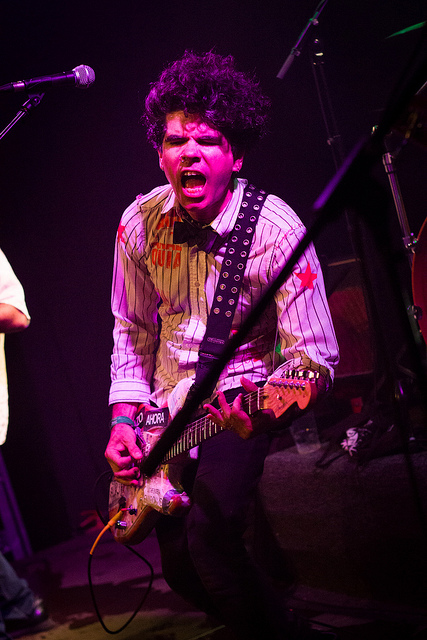He May Not Like Politics … but Politics Sure Likes Him, My Friends!
by Orlando Luis Pardo Lazo translated by Alex Higson / November 25, 2014 / No comments
The Cuban punk band Porno para Ricardo makes music that challenges Castro’s regime.

Gorki Águila of Porno para Ricardo. photo via Flickr user: Anthony Roderman
His name is Gorki Águila, and he’s Cuba’s most controversial musician. He is the lead in a punk rock band that goes by the name of Porno para Ricardo (Porn for Richard) in a country where desire is a criminal offense. Gorki founded the group in Havana back in 1998, and Cuba’s cultural landscape — in both its official and underground incarnations — has never been the same. You might say that Gorki and his inflammatory songs stay on the island for a single reason: to blast away the apathy of Cuba’s narrow-minded intelligentsia, which has grown too accustomed to the despotic-paternalistic model of punishing or rewarding creative people as though they were its belongings.

- Is it worth-while to focus on the last images and letters coming from the inside of the last living utopia on Earth? Is Cuba by now a contemporary country or just another old-fashioned delusion in the middle of Nowhere-America? A Cold-War Northtalgia maybe? Can we expect a young Rewwwolution.cu within that Ancien Régime still known as The Revolution? I would like to provoke more questions than answers.

- Orlando Luis Pardo Lazo was born in Havana City and still resides and resists there, working as a free-lance writer, photographer and blogger. He is the author of Boring Home (2009) and is the editor of the independent opinion and literary e-zine Voces.
To begin with, Porno para Ricardo was left to its own devices in organizing their first concerts and participating in interviews with the prudish national press. But the tyrants could not put up with Gorki for long; there’s no place for those like him in Castroism. His lyrics are explosive: anarchy becomes analchy, and he describes 1959 — the year of Revolutionary victory — as “the year of error.” These words have turned Gorki into something more than just another person to be censored: he is an outcast, a proletarian pariah who ties the Communist pioneer’s neckerchief around his neck tight enough to choke, before beating his guitar and singing his catchy insults to Commander-in-Chief Fidel. This is exactly what Gorki wants to be for as long as Cuba’s dictatorship endures. Whenever the censors forget about him, Gorki seems to seek out censorship himself.
He has been jailed several times, and always for illegitimate reasons. The first time, 10 years ago, he was arrested for giving a groupie, who was actually a policewoman in disguise, two amphetamine pills. The second time, in 2008, it was for “social dangerousness” after a noise complaint. Cuban civil society mobilized support for him online, making it impossible for the state to imprison him again. After a week in solitary confinement, the government reduced his charge to “public disorder” and fined him 600 Cuban pesos, equivalent to $28 USD, which Gorki paid using several bags of coins.
Since then, Porno para Ricardo’s greatest problems have come from the state police, who spy on the band and harass them, as well as the departure of some of the band’s members after receiving threats from State Security. Some members have claimed political asylum overseas and gone into lifelong exile. But Gorki is pig-headed: he stubbornly stands up to totalitarian rule with every bone in his body. He usually tells his friends that he will never leave Cuba, even though there is no place on the island for his marginalized work.
Gorki’s parodies take ownership of heroic anthems and socialism’s solemnest symbols. His language is crude, crackling, confounding. He is no angel, but a pro-democratic demon who can turn offense into ostentation. His body is his public —and shameless — place of resistance: his poetics — or punkethics — could be classified as “pornopolitics of resistance.”
One of the recurring messages of Porno para Ricardo’s songs is: “I don’t like politics … but politics sure like me, my friends!” This declaration makes clear that in Cuba, whatever you do, there is no point in hiding from politics. Propaganda, populist demagogy, state corruption and human rights violations take hold of everything in this country, and sooner or later they exert their power over you. Is this sadosocialism? If so, remaining silent is an extreme form of complicity.
Gorki has managed to leave the island on several occasions and has made an impact on the rest of the world with his acid sense of humor, which is always full of optimism in a “future that belongs entirely to the future,” to quote to one of his own songs. Since all of Cuba’s record labels are the private property of the same government that condemns them, he produces his records in amateur studios hidden in people’s homes. Porno para Ricardo’s voice, which moves from club to club on the island like a digital ghost, is now available to all those who want to support its message. As independent Cuban activists and artists become more visible, their revolutionary oppressors lose their impunity.




